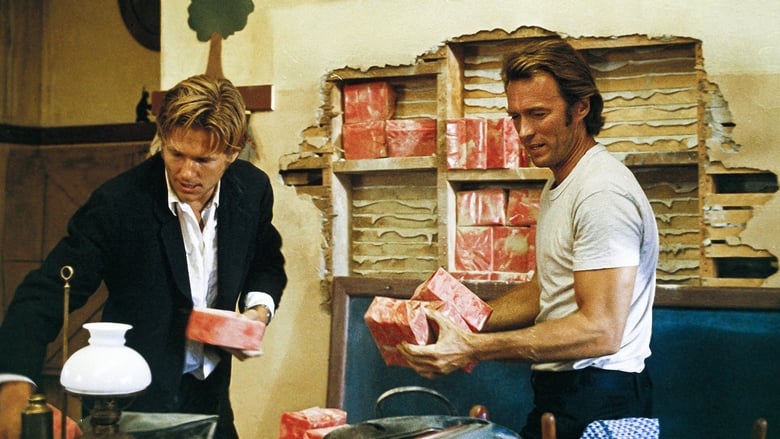← Back to Reviews

in
#720 - Thunderbolt and Lightfoot
Michael Cimino, 1974

A former bank robber crosses paths with a young car thief who encourages him to go back to pulling off heists.
Before Michael Cimino hit Oscar gold with visceral Vietnam War melodrama The Deer Hunter, he directed a little film called Thunderbolt and Lightfoot that starred Clint Eastwood and Jeff Bridges as Thunderbolt and Lightfoot respectively. The former is a veteran thief in hiding who is tracked down by his murderous former partners (George Kennedy and Geoffrey Lewis), while the latter is a reckless small-time crook who starts the film by stealing a used car out of a dealership. They cross paths soon enough and, despite some resistance on Eastwood's part, they gradually warm up to each other. This makes the film into a typical early-'70s road movie for a good chunk of its running time with all the problems that that entails. I don't deny that there are classics in that regard, but Thunderbolt and Lightfoot definitely doesn't feel like one as it indulges a lot of the usual counterculture road movie clichés with virtually none of the charm. The most egregious example of this is an early example where Bridges manages to rope a couple of rather impressionable women into being one-night-stands for both him and Eastwood, with their treatment being a pretty distinct representation of just how poorly female characters tend to fare in movies of this ilk.
It's only once the duo reunite with Eastwood's former partners to pull off another heist that the film gains any significant structure to its plot, but there's nothing terribly exciting about the heist that they do plan to pull off. The tensions between the main quartet and their distinctive personalities ends up being more watchable than the actual heist itself. Eastwood and Bridges naturally fill out the roles of grizzled pro and fresh-faced upstart respectively; meanwhile, Kennedy proves an incredibly belligerent and antagonistic force of nature even after he gives up on trying to kill Eastwood and sides with him. Though Bonnie and Clyde showed how the road movie could deftly be combined with the heist movie, this doesn't translate into success for Thunderbolt and Lightfoot. The whole thing ends up being a slog for the most part that is only really redeemed by Eastwood and Bridges sharing some decent (but not amazing) chemistry, to say nothing of the odd memorable scene (such the entire sequence that involves the duo hitching a ride with a crazed driver, which might just be the best scene in the film because of how left-field it ends up being). One could just as easily see Thunderbolt and Lightfoot as a cynical attempt to cash in on the success (both critical and commercial) of similarly road-based New Hollywood movies - whatever the case, the film certainly doesn't do enough to justify itself to the contrary.
Michael Cimino, 1974

A former bank robber crosses paths with a young car thief who encourages him to go back to pulling off heists.
Before Michael Cimino hit Oscar gold with visceral Vietnam War melodrama The Deer Hunter, he directed a little film called Thunderbolt and Lightfoot that starred Clint Eastwood and Jeff Bridges as Thunderbolt and Lightfoot respectively. The former is a veteran thief in hiding who is tracked down by his murderous former partners (George Kennedy and Geoffrey Lewis), while the latter is a reckless small-time crook who starts the film by stealing a used car out of a dealership. They cross paths soon enough and, despite some resistance on Eastwood's part, they gradually warm up to each other. This makes the film into a typical early-'70s road movie for a good chunk of its running time with all the problems that that entails. I don't deny that there are classics in that regard, but Thunderbolt and Lightfoot definitely doesn't feel like one as it indulges a lot of the usual counterculture road movie clichés with virtually none of the charm. The most egregious example of this is an early example where Bridges manages to rope a couple of rather impressionable women into being one-night-stands for both him and Eastwood, with their treatment being a pretty distinct representation of just how poorly female characters tend to fare in movies of this ilk.
It's only once the duo reunite with Eastwood's former partners to pull off another heist that the film gains any significant structure to its plot, but there's nothing terribly exciting about the heist that they do plan to pull off. The tensions between the main quartet and their distinctive personalities ends up being more watchable than the actual heist itself. Eastwood and Bridges naturally fill out the roles of grizzled pro and fresh-faced upstart respectively; meanwhile, Kennedy proves an incredibly belligerent and antagonistic force of nature even after he gives up on trying to kill Eastwood and sides with him. Though Bonnie and Clyde showed how the road movie could deftly be combined with the heist movie, this doesn't translate into success for Thunderbolt and Lightfoot. The whole thing ends up being a slog for the most part that is only really redeemed by Eastwood and Bridges sharing some decent (but not amazing) chemistry, to say nothing of the odd memorable scene (such the entire sequence that involves the duo hitching a ride with a crazed driver, which might just be the best scene in the film because of how left-field it ends up being). One could just as easily see Thunderbolt and Lightfoot as a cynical attempt to cash in on the success (both critical and commercial) of similarly road-based New Hollywood movies - whatever the case, the film certainly doesn't do enough to justify itself to the contrary.
